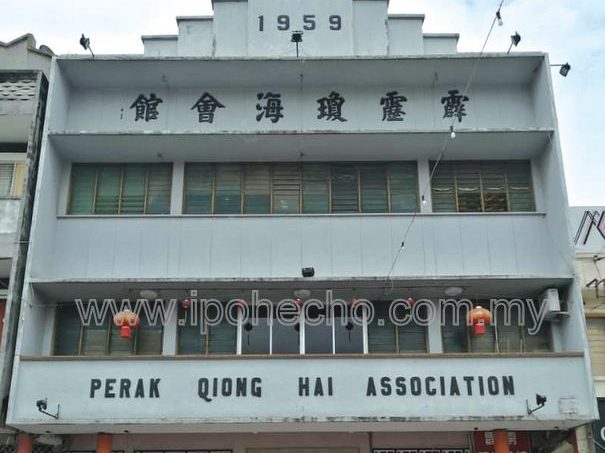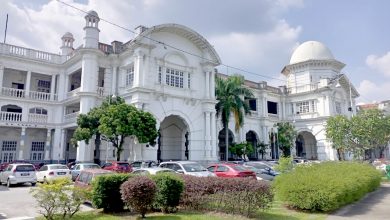

By Chris Teh
Historically, Ipoh has been one of the cities in Malaysia where many associations were formed for the purpose of preserving one’s heritage and to mingle with others who come from the same background.
Today, the common concern of these associations is that the younger generation has little interest in their heritage and are reluctant to participate in activities organized by such associations. To get a deeper understanding of this societal phenomenon, Ipoh Echo went in search. As there are many associations in Ipoh itself, we only covered a few which were open for interviews.
While elders wish to keep traditions alive, the younger generation has other priorities…
The following are just examples of struggling heritage-based associations.
Malaysia Huadu Association
Loh Ngee Pin, 86, president of the association, stated that although the association is still active, the lack of active younger members concerns him and the association about the future of Huadu heritage and culture.
“We organize activities every now and then, but the younger members attend only if they are requested or invited to. Otherwise, they would not have the initiative,” Ngee Pin said.


He elaborated that the association also provides support to members and their children and activities organized out of Perak that concern the association.
Major traditional Chinese festivals such as Chinese New Year gatherings, Duanwu Jie (Dragon Boat Festival) and Dongzhi (winter solstice), not to mention annual dinners organized by the association every year end, are a few of the activities Malaysia Huadu Association is jointly involved with other Chinese associations in Ipoh.
Chong Boon Yoke, 58, secretary of the association, voiced out her similar concern about the lack of active involvement from members of the younger generation.
“Most of the active members are ageing and without any potential successors from the upcoming generation, our cultures and traditions could easily vanish in the future,” Chong elaborated.
She also added that young members constitute only an approximate 30 per cent to the total member size of Malaysia Huadu Association, which is quite alarming.
Established in 1955, the association was originally named “Perak Fah Yuen Wui Koon” (literally translated Perak Fah Yuen Association).
Loh Liong Fah, 71, the assistant secretary, highlighted that in the event of China renaming Hua Xian (county) in 1993 to present day Huadu District which is part of the Canton Province’s capital, Guangzhou, “Perak Fah Yuen Wui Koon” had officially changed their name to “Malaysia Huadu Association” in 2011.


Asked on the association’s objective, he answered, “Malaysia Huadu Association was established to not only be a fraternity of social contacts for people with origins similar to us but also as a preserver of our heritage.”
Liong Fah added, “The objectives of our association have not changed throughout its operation for 64 years, although we devise different methods to accomplish them to cope with timely and societal changes.”
Liong Fah added that some members of the association occasionally travel back to Huadu District, China to obtain updates on any news of familial ancestors and descendants that are scattered around Malaysia or China itself.
“We recently received a request from a fellow member who lives in Kuala Lumpur who wants to locate his long lost ancestry. What we do is we assist in finding the exact location of his ancestors’ hometown in Huadu, China,” he explained.
Perak Phun Yue Association


Another example of a surviving association, we only managed to interview a longtime member of the association, Chong Kee Sang, 84, who said, “Younger members of our association do not genuinely know about their ancestry’s root. We used to be very active before the millennium year but now we are only organizing annual dinners every Independence Day of Malaysia.”
According to Chong, there were many unresolved misunderstandings within the Phun Yue Association, which led to why the association is now in the hands of the younger generation.


“I still remember an annual dinner back in the year 2000, where it was severely disrupted because some people were dissatisfied with our association, but it is water under the bridge now,” he recalled.
“I would say that the younger members have strayed far from the association’s objectives, but as long as they keep the association active and not tarnish the long-running reputation of Phun Yue, I am already content.”
Phun Yue Association was established in 1934 with the objective of enabling immigrants from Phun Yue, China to search for jobs and as a social network platform of fellow Phun Yue tribes in pre-independence Malaya.
Ipoh Echo also contacted several other associations such as the Perak Toi San Association, Perak Qiong Hai Association and Perak Yungting Association but no responses were received.
Dying associations
Wushu Club of Luo Han Duan
Previously named Perak Pyramid Weightlifting and Bodybuilding Association (P.P.W.L & B.B.A), the association was established in 1926.
P. P. W. L & B. B. A was known for organizing bodybuilding competitions, notably Mr Perak 1974. At its peak during the 80s, there were over 1000 members and a lion dance troupe which is still active.


According to Wushu Club of Luo Han Duan secretary Yap Chin Kooi, the association no longer goes under the name ‘P.P.W.L & B.B.A’ because the registrar of societies’ states the association would have to be registered under a new name or else they would have to cease all lion dance activities.
The association had received many contributions from a few honourable individuals, such as the late Dato’ Seri Lau Pak Khuan and late Tan Sri Dato’ Seri Lee Loy Seng.
Today, the club is involved in lion dance activities and table tennis occasionally, although self-defence classes like taekwondo and karate from senior members were discontinued.
Freemasons
“Freemasonry does not exactly appeal to the younger generation,” said Sreethararaj, 57, a Freemasons member for almost 12 years.
“It is more of a fellowship, where ceremonies and rituals are part of the social gathering among the members. The society does not publicize their activities, although they are anonymously involved in charities and relief to victims of natural disasters, such as those from Aceh Province in Indonesia,” he elaborated.
“Most members are in their 30s and 40s. Some are already very old,” he stated.


Asked on the membership of the society, Sreethararaj answered, “Freemasons are indeed experiencing a decline in membership, especially from the younger generation, mainly due to them not knowing what actually goes on within the society given its reclusive nature, which is why the society is currently organizing mentoring and team building programmes to attract them to join.”
He highlighted, “The suitability criteria for joining Freemasons used to be very strict, but today, as long as one is not criminally convicted and believes in the existence of a Supreme Being, individuals from all ethnicities are welcome to join.”
A notable member of the Freemasons was the late Sultan Idris Shah II, the 33rd Sultan of Perak, reigning from 1963 to 1984.
The most prominent Masonic Lodge in Perak is perhaps the Tiger Lane ‘Temple’, as mentioned by Sreethararaj, beside the Royal Perak Golf Club, which is the main lodge in Ipoh, where annual meetings and gatherings are mostly held.
The Younger Generation
We also approached Ipohites of the younger generation on their willingness to join heritage-concerned associations.
Muhamad Fahmi, 28, an Ipohite working as a medical assistant, said that joining associations will be the very last thought that comes to his mind.
“I recently became a father to a newborn daughter, and I have many things to look out for,” he stated. “It is not currently the most suitable time to join an association. I fear that I will not be able to fully commit to being a member.”
Adding to his views, Fahmi said the desirability of joining an association depends on the ideals and objectives an association leans on, especially old ones. “I would like to see any relevance of joining an association given the rising costs of living and whether the association is able to inspire me to improve my way of life.”
Chris Chong, 27, an avid reader of Ipoh Echo, said that he would consider joining an association if its ideals and goals match his interests.
“I will not join any associations just for the sake of saving it,” he stated. “To be a member of any association, one has the obligation to contribute, not to just sit around.”
In a more elaborative opinion, Chong said, “I am just feeding older members’ ego if I join associations that do not have a commitment to a cause, which if they are, they would not be struggling with the lack of younger members today.”
Shivarhuban, 23, an Ipohite currently furthering his studies at Universiti Utara Malaysia, voiced his interest in joining an association.
“The trend of ignoring their cultural origins is quite common among my friends, which is rather worrying. Being a member of these associations is a good opportunity to take part in learning more of one’s heritage and preserving those values.”


Tan hopes that heritage-based associations are open to all and not be separatist groups.
“As an obligation and social responsibility of being Malaysian, I would love to learn more on the heritage of others, as well as my own,” she highlighted.
Sara Chu, 26, fellow Ipohite working in Kuala Lumpur, said she would not join any associations due to career and time constraints.
“I am already very busy working in the customer service line, so I rarely have time for myself, let alone to join an association,” Sara explained.
She added, “Rarely do I have the opportunity to get some free time off, and I would rather spend them by hanging out with my friends or doing things I like, not to join associations which I know little to nothing about.”
Voicing out his similar opinion, Devendran, 33, an Ipohite working as a factory operator, stated that due to his busy work schedule, he does not take an interest in joining any associations.
“It is physically demanding to work in an industrial line,” he said.
Adding to his opinion, he answered, “I prefer resting at home or catching up with my favourite entertainment during my off days.”


“Working in the medical field demands a lot from me, so the thought of joining an association never comes to mind,” he explained. “If I have lesser commitments in the future, I might consider joining one, because it will be nice to know more about my origins.”
“I am not even sure about my own heritage,” said Ipohite Afiqah Rafael, 22. She explained, “My father is an Indian while my mother has Turkish and Pakistani origins, which is why I am unsure about my own roots.”
So the question arises for a lot of these heritage/cultural associations: How can the elders make their associations more attractive and relevant to the younger generation to avoid falling into obsolescence as some of them already are?


